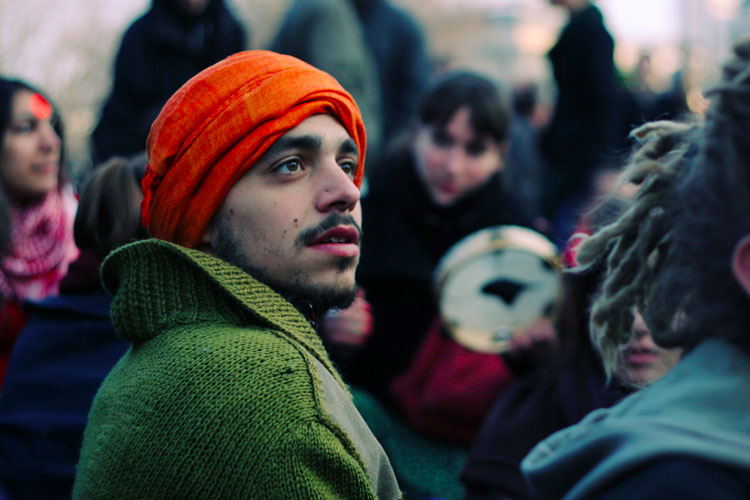
Image by Charlotte Gonzales/Flickr, Attribution-NonCommercial.
The Twin Forces of Love and Resistance
As Beverly Gage pointed out in last week’s New York Times, the word that has risen from the ashes of this presidential calamity is resistance. People are resisting misogyny in hand-knit hats, resisting xenophobia while eating donated pizzas at airports, resisting — above all else — their own devastation and disconnection.
It’s a powerful word — one that suggests a kind of righteous, resolute line in the sand. Something un-ignorable. Something strong. Something ongoing. The languaging of this burgeoning movement brings me a surprising amount of comfort, as if the word itself is a tent that can shelter the millions of people who woke up with a palpable heartache on November 9 that isn’t going away.
But I’m also aware of the limitations of such a word. Resistance is defined by being almost entirely reactionary. There is no counterforce where there is not, first and foremost, a force. In this case, of course, that force is President Trump, but even more accurately, the assortment of dangerous, overly certain, dualistic, power hungry politicians he’s surrounded himself with. (Increasingly I get the sense that Trump only wanted to get more famous and has now found himself the accidental conduit for men with far more broad, violent, and sinister ambitions.)
The ongoing challenge of this moment, therefore, seems to be assessing this force accurately and perpetually, and mounting a creative, collective counterforce — the resistance. That would be work enough (next to the dirty dishes and the paid work and the wiping of feverish brows), but it’s not, as it turns out, enough. We must also remember to be a force of our own. We must also remember not just to undo the damage that Trump and his men are inflicting on a daily basis, but to build something simultaneously. We must crouch in a protective posture and also embrace and dance and paint and write poems and teach and heal and surprise and dream and plan. In other words, we must love.
Resist and love. Resist and love. Resist and love.
I have a growing confidence in our capacity to resist. It seems to be happening at larger scales, in more creative, constant ways than at any other moment in my lifetime. People who never thought of themselves as political are being unapologetically political, and in inconvenient spaces, too — conference rooms at work and around the dining room table of hoodwinked relatives. People who have never been to a protest in their lives are showing up at protests. A few years ago, it was perfectly normal to ask the question: why don’t people get out into the streets anymore? Is protest over as a social movement strategy? Today, one could never ask that and be taken seriously. People whose lives were once largely privatized are now collectivizing — inviting neighbors for resistance potlucks, showing up en force at local mosques to express solidarity, writing letters and making phone calls and signing petitions ad nauseam.
But resistance alone risks becoming its own form of worship. In order to resist, you must channel your energy toward undoing the unwise and the immoral. You can become myopic, basking all your precious attention on those who don’t deserve it. Which is why one must resist violence, but also resist the inclination to become single-minded about that resistance. When I recently stumbled on Alice Walker’s poem “Each One, Pull One” it took my breath away. Among much else, it reminds us to keep our oppressors in sight, but not fall into focusing on them:
“We do not worship them / We do not worship what they have made. / We do not trust them.”
The best protection against an overactive reliance on resistance is love. And yet, I am not as confident in our capacity to love. As Krista Tippett writes of love in Becoming Wise:
“We’ve made it private, contained it in family, when its audacity is in its potential to cross tribal lines. We’ve fetishized it as romance, when its true measure is a quality of sustained, practical care. We’ve lived it as a feeling, when it is a way of being.”
Just as our lives — especially white, economically privileged lives — have suffered from over-privatization, our notion of love has suffered from an over-interpersonalization. We hear love and we think marriage. Worse yet, in the age of dating apps, we hear love and we think swipe. The commodification and Tinder-ization of love isn’t just bad for our romantic relationships; it’s bad for our nation. We think of love as solely intimate, as tumultuous, as something we choose to bestow or withhold based on someone’s capacity to earn it and keep earning it.
But real love is radical because it cannot be earned or unearned. It is tied to inherent dignity. It is unconquerable because it is dumb in its own way — determined to keep loving no matter what the counter forces, no matter what scarcity small men try to message, no matter what fear they try to sow. It’s blindly trusting, also positioned as stupid in our overly strategic society. It’s inefficient, a sin in our efficiency-obsessed time.
It is perhaps most clearly understood as maternal. Just as mothers have, from time immemorial, loved without condition, we must now love this nation like mothers. We must parent it into a new maturity. We must not give up on it, no matter what. We must be prepared to be surprised at how beautiful it will be. We must do all this without knowing what form it will take, but knowing that whatever it becomes will be rewarding if it is shaped by fierce, unending, active love.
This kind of love looks like the community center in Oakland, California where I take my daughters, the walls inside covered with indecipherable art and the surrounding courts outside filled with laughter and sweating bodies. Love looks like the fairly conservative Catholic church my mother and father-in-law attend in Milwaukee, Wisconsin recommitting to building beloved community, welcoming and welcoming and welcoming. Love looks like a muralist I met in Richmond, Virginia who is interviewing elders about their lives and then helping them create a large-scale mural out of the stories that are surfaced. Love looks like The Cottages at Hickory Crossing in Dallas that just opened for the chronically homeless. Every unit already had a crockpot and a toothbrush and a television the moment that the new residents walked in.
We’re proving ourselves capable of a mighty resistance, but we must also prove ourselves capable of this kind of expansive love. The twinning of the two will be this country’s salvation.

